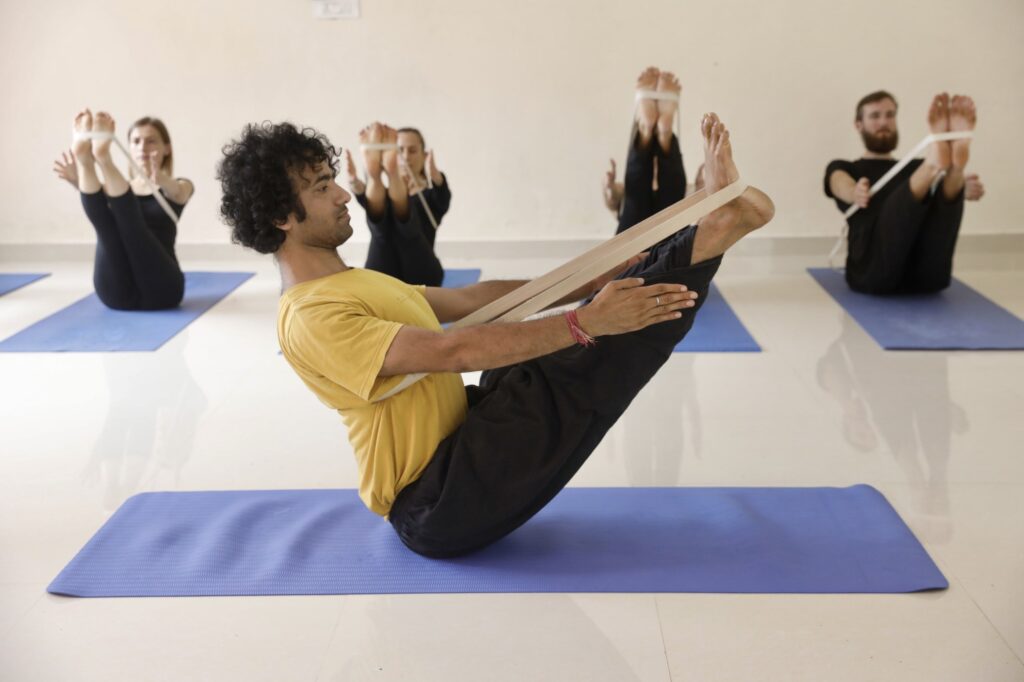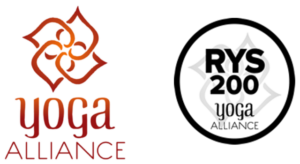200 Hours Ashtanga Yoga & Hatha Yoga Teacher Training in Kerala India
In our Ashtanga and Hatha Yoga Teacher Trainings in Varkala, Kerala in India, we combine the wisdom of two ancient traditional styles of Yoga by creating a unique 200 HoursYoga instructor course, drawing from the strengths and beauty of both – the dynamic yet meditative quality of Ashtanga Yoga and the focus on proper alignment of Hatha Yoga. Our 200 Hours Yoga TTC in Kerala, offers not only the strengthening of your own asana practice but also an immersion into Yoga Philosophy, Meditation, and Pranayama. What is essential, our Yoga classes of Anatomy and Art of Teaching provide with the tools you need to develop as a Yoga teacher.
Journeying on the yogic path is in itself incredibly transformative. However, becoming a Yoga Teacher dedicated to assist others in walking that path can be even more rewarding. At Yoga Sangha, we intend to create an opportunity for serious practitioners who wish to explore the journey of spreading Yoga as a way of life and helping people raise their self-awareness through the experience of Yoga practice.
The quality of the course comes from giving each student our maximum attention. For this reason, each TTC group counts around 15 students only, which gives us a chance to look after everyone well and make their learning experience as effective as possible.
Our course encourages self-study and self-awareness which we believe to be crucial features of a Yoga Teacher. We invite you to become part of our community where we support each other in the learning process, inspire each other and collaborate to create an even broader scope for Yoga practice.
Our TTCs are Yoga Alliance Certified

200 Hours Yoga Teacher Training Varkala Kerala
CURRICULUM
The day starts with Asana and Pranayama practice. During this two-hour class, we help you build a disciplined practice by focusing on proper alignment, connecting with your breath and channeling the Prana, your vital energy. In order to be able to help your future students maximise the therapeutic benefits of yogasana practice, the class will equip you with practical knowledge of using yoga props to support and correct the postures. Throughout the training, the Asanas of the Ashtanga Primary Series are discussed and practiced in-depth in the morning Hatha class, while the afternoon class is devoted to deepening the practice of Ashtanga Mysore Style in which the students practice the sequence at their own pace with the teacher’s support and adjustment given individually. Every alternate day, the class follows the Led class format in which the Teacher instructs the breath and the Asanas of the sequence.
See our Ashtanga Primary series chart
See our Hatha Yoga Chart
See our Yoga Study Materials
YOGA PHILOSOPHY
Yoga is one of the six classical schools of Indian philosophy. This class is designed to give you an understating of the objective of Yoga and the path to reach it. We talk about the Eight Limbs of Yoga from the perspective of Patanjali’s Yoga Sutras but we also discuss their connection to our contemporary day-to-day life.
YOGIC TEXTS READING
As a complement to the Philosophy class, every week students get familiar with ancient classical texts about Yoga to advance their understanding. Fragments of four classical texts are read, explained and discussed in class: Patanjali’s Yoga Sutras, the Bhagavad Gita, Hatha Yoga Pradipika, and the Upanishads. By being exposed to the ancient scriptures, students get a deeper understanding of the various paths of Yoga.
YOGIC ANATOMY & PHYSIOLOGY
In order to teach and guide your students, to check and correct their alignment as they practice Asanas, it is necessary to have a solid foundation and proper understanding of the anatomy and physiology of the human body. Knowing anatomy empowers the practitioner and gives him/her tools to address the imbalances in the body and to deepen the postural practice by moving to more advanced yoga poses. The knowledge of muscular engagement and anatomical alignment becomes a key to self-awareness at the physical level of Yoga practice.
THE ART OF TEACHING
Being a strong Yoga practitioner is different from being a good Yoga teacher. We designed this class to help you master the art of teaching. In this class, you acquire and refine such skills as precise instruction, clear demonstration, mindful observation, and effective adjustment. We dedicate a significant amount of time to the sequencing process in order to help you develop a balanced class in one of the different styles of postural yoga. Throughout the course, you get hands-on teaching experience followed by peer and teacher feedback. Moreover, this class will help you generate a vision for yourself as a yoga teacher and give you ideas for how to continue on your yoga teaching path.
MEDITATION
In the Eight Limbs of Yoga, achieving the state of deep meditation is necessary to achieve the true goal of Yoga. In our Yoga teacher training, we emphasise the practice of meditation as an equally significant part as asana practice. During the course, you become familiar with various types of meditation and contemplative techniques, both ancient and modern, which gives a unique opportunity to learn, deepen and incorporate such styles of meditation as:
- Cyclic meditation
- Chakra meditation
- MSRT Meditation
- Kundalini meditation
- PET Meditation
- Mind to No-Mind meditation
- Third Eye meditation
- Sufi Meditation
- Intensive Breath meditation
- Silent Meditation
- OM Meditation
- Nadanusandhana
AYURVEDA
In our 200h Yoga Teacher Training in Kerala we introduce the elements of Ayurvedic principles and follow in the everyday functioning of the course. Every student is going to have an opportunity to meet an Ayurvedic doctor in order to find out their constitution (dosha) and discuss their health condition during an in-depth personalised consultation. The doctor will give dietary and lifestyle suggestions to improve the student’s well-being.
FOOD PREPARATION
Ayurveda states that you are what you eat. Following this principle, we set it as a goal for ourselves to help our students incorporate an Ayurvedic diet, whose quality is sattva (pure, honest, clean), into their everyday life. Sattvic food brings lightness to the body and is very complementry to Yoga practice.
DAILY SCHEDULE
Weekly schedule (might undergo slight changes)
Monday to Saturday
7:00-8:45 Hatha & Pranayama Practice
9:00-10:15 breakfast
10:15-11:15 Yoga & Samkhya Philosophy
11:30-12:30 Art of Teaching & Mechanics of Asana
12:30-14:45 Lunch & rest
14:45-15:45 Anatomy & Physiology
16:00-17:45 Ashtanga Vinyasa
18:30-19:30 Meditation
19:30-20:30 dinner
PREREQUISITES
1. You are required to have a preliminary self-practice before joining our 200 Hours Yoga TTC in Kerala. As a Yoga school, we cannot quantify the time of practice necessary to participate in the Yoga TTC course, however, we suggest you consider a Yoga TTC if you have regularly practiced a minimum 3 times a week for a minimum of 6 months. In case you are not sure if you are ready, scroll down to check special features and find out what options you have at the Yoga Sangha
2. It is not necessary to have practiced Ashtanga Vinyasa before. The practice of Hatha Yoga is sufficient to join the course.
3. The following readings are recommended: Siddhartha (120 pages) by Hermann Hesse, Yoga Body: Yogamala by K Pattabhi Jois, Autobiography of a Yogi by Paramahansa Yogananda, Many lives many masters by Dr. Brian Weiss, the classic Light on Yoga and Light on Pranayama by B.K.S. Iyengar. We also recommend listening to lectures by Sadguru (easily available on youtube), and watching such films as Seven Years in Tibet, Little Buddha, and Siddharta (the 1972 adaptation of Hermann Hesse’s book). The study material Section on our website is also very useful. You can also go through it and have some idea about it. They will all serve as good preparation and tuning in with the mind frame present during the course.
4. We also encourage you to come with an open mind and keep an attitude of humble learning and non-judgment as everything you encounter during the course can greatly benefit you.
SPECIAL FEATURES
100 Hours + 100 Hours Yoga TTC
At Yoga Sangha, we wish to be accommodative to those for whom taking a month off from their daily life to do the Yoga TTC might be challenging. There is an option of dividing the course into two parts and coming twice for two weeks to do 100 Hours of the course at a convenient time.
Non-practitioners
We also realize that different circumstances inspire us to undertake a certain journey in life. There are those who discover they would like to pursue the path of Yoga and Yoga teaching without having an established practice. If you want to dedicate yourself to a Yoga TTC but your self-practice is not strong, you are most welcome to come to Yoga Sangha and participate in a one-month-Iong preparatory course just before the Yoga TTC. You are required to take care of your expenses including food and accommodation.
Dedicated practitioners
Our idea of introducing the practice of Bhakti Yoga, the path of love and devotion, consists in that we encourage dedicated students to stay with us after the Yoga Teacher Training and assist in the further course(s). That way by offering to demonstrate and adjust in classes, students already get their first experience of teaching but also express their dedication to Yoga. You are required to take care of your expenses including food and accommodation.
Continuous support
At the heart of our values lies the idea of a community. Therefore, after the course you can count on our support – you are welcome to stay in touch with us, ask questions, clear your doubts, propose joint ventures such as workshops or talks, or write for our blog. We encourage an exchange of ideas and experiences with other students from our TTCs to enrich your teaching and continue to grow through our closed group.
Important
If you are a beginner in your Yoga practice or you have a doubt about whether your asana practice is enough to do the course, get in touch with us. We’re there to support you before the course by offering study material: readings and videos as well as calls to clarify your doubts and to provide you with the foundation you will need to start the course with a good degree of comfort.
What is Ashtanga Yoga?
Ashtanga yoga means the eight limbs of yoga. It was first referenced around ( 500 – 300 ) BC by the great sage Patanjali. He categorized yoga into eight branches, and it is the reason it’s known as eight-limbed yoga or Ashtanga Yoga. It is an art of conscious living combined with a spiritual practice that leads one to self-knowledge, freedom, and better physical health. For more details on Ashtanga Yoga, Click here
What is Hatha Yoga?
Hatha yoga is the ‘Discipline of Force.’ It uses physical force to channel the vital energy of the body. The Sanskrit word Hath means force, and physical techniques are used to preserve and move this energy. This technique is thus known as Hatha Yoga. One more definition of Hatha yoga is derived from the Sanskrit word, ‘Ha’, means Sun and ‘Tha’ means moon. Thus it is a yoga of alignment of the two energies. For more details on Hatha Yoga, Click here
Enquire now to discuss your requirements. Fill in the registration form below or email/Whatsapp us on info@devvratyoga.com / +91 9632307916

Newsletter
Upcoming events and latest blogs